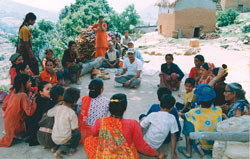|
|
| PUT YOUR MONEY WHERE YOUR MOUTH IS: Rrural areas need community workers and resources to run regular information programs and q-and-a\'s such as this one in Dang last year, but there just isn\'t enough funding. |
There's lots of talk about dealing with HIV in Nepal. But that's the problem. It's a lot of talk.
Awareness remains rudimentary and stigma, strong. For example, few people know about the factors involved in early onset and worsening of HIV symptoms. These are conditions common to the lives of most Nepalis-lifestyle factors like a heavy workload, poor living conditions and frequent infections, poor nutrition, and lack of access to good healthcare. Instead, reaction in remote communities remain at the level of blame and social ostracism.
Poor Nepalis need better treatment options and a whole lot more information if attitudes are to change. Money is a major problem. Not the lack of it, but how it is dispensed. Work in rural areas and you see how little money actually goes to local community organisations that have concrete knowledge of the social and working conditions that affect project work.
Small rural organisations working successfully to spread awareness and information don't always know how to write slick pitches and don't have Kathmandu connections. This means they lose out in the funding race. "People with good English come, take all the information we have, write proposals, and get money.
They never show up after that. We've heard there's a lot of money in HIV/AIDS. Funny we've never seen it," a local coordinator told me on a recent trip to far-west Nepal.
Some local organisations such as Gangotri (see 'They don't get rich, they get HIV') are trying to help AIDS orphans and widows in a number of ways including financially. "But," says Rupa Auji of Gangotri, "as an organisation we are also poor and we have no idea how much longer we can help them."
To add insult to injury, community health workers in Achham say they are strongly encouraged to work on a volunteer basis-by experts from Kathmandu who themselves earn over $100 a day. "In what world is this fair?" asked a woman who has worked with AIDS widows for the last five years.
The double standards are pervasive. The Health Ministry wants female community health workers (FCHV) to be volunteers and boosts that its "48,000 FCHVs are the pillars of our health system". Yet it withdrew even the token Rs 100 per month they were paid at the start of the program because "money kills the spirit of volunteerism. Meanwhile well-off people with enough time to actually volunteer their services get paid handsomely to go work in rural areas for short spells.
In Kathmandu there are donor-funded receptions, workshops, and seminars and feel-good banners and rallies on AIDS Day which the media duly covers. Out in the field health and community workers struggle to keep their initiatives afloat and little changes. "We sit helplessly watching people suffer and die," says a doctor from the far-west. "Seminars and rallies do play an important role in lobbying the government. But there has to be money going to the real programs that make a difference in rural areas."
The offence is partly financial and partly in the mistaken assumption that volunteers will take care of the community work so large organisations can devote their time to strategising and fundraising, instead of supporting and strengthening awareness and prevention programs on the ground.
HIV/AIDS largely affects young people, the economic backbone of the country. The epidemic and the response to it are worst in the far-west, but will destroy the rural communities around the country, particularly women and the disadvantaged.
There are people who need better care and counselling than they are getting now even in Kathmandu. And it helps no one, not individual patients and their families, and not development efforts, if doctors, and health and community service volunteers are underfunded and demoralised.




